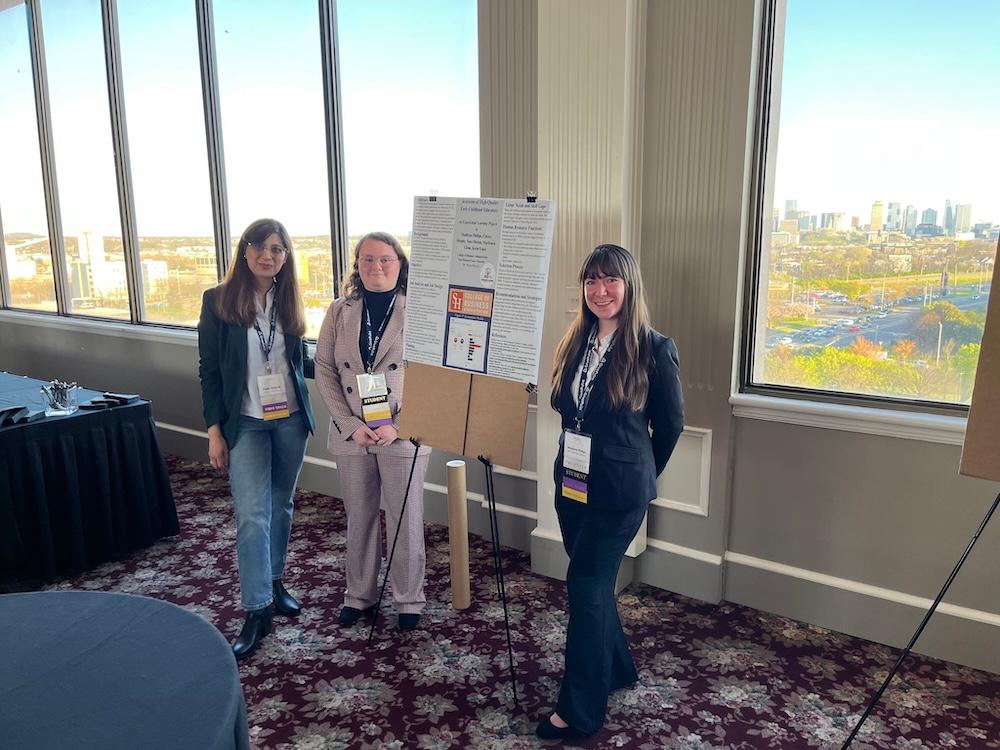Today@Sam Article
COBA ACE Courses Highlight Local Opportunities for Bearkats
July 23, 2025
SHSU Media Contact: Campbell Atkins

Two Academic Community Engagement (ACE) courses from Sam Houston State University's College of Business Administration (COBA) have been featured in the most recent volume of the college’s Journal of Business Strategies. These two case studies highlight the mutually beneficial nature of ACE courses between students, faculty and community partners.
The Case Studies in Community-Engaged Business Education section was orchestrated by COBA professor and ACE coordinator Danica Schieber, who serves as section editor.
“The collaboration between institutions of higher education and their larger communities serve to enrich scholarship, prepare educated and engaged citizens, strengthen civic responsibility, address societal issues and contribute to the public good,” said Schieber in a brief introduction.
Through the university’s Center for Community Engagement (CCE), Sam Houston State offers a plethora of opportunities to gain professional experience outside of a traditional classroom setting. The study highlighted a pair of examples offered to business students, led by professors Ali Mchiri and Huda Masood.
Masood’s human resource management students partnered with Huntsville-based Tomorrow’s Promise Montessori Schools (TPMS), a longstanding non-profit organization with three locations in the area. The students focused primarily on providing TPMS solutions to their high turnover rates.
“The project’s key deliverables for students included a job design, recruitment strategy and retention plan based on other HR functions such as training, performance management and total rewards structure for the target job,” Masood said. “Students were required to implement their recommended recruitment strategy after securing approval from the client.”
After breaking into groups, the students scoured datasets to identify industry standards and recommend the most appropriate strategies moving forward. They also helped with the client’s recruitment needs through social media, events and word-of-mouth. After establishing a retention plan, the groups presented their semester-long work in a professional presentation to founder and CEO Kaye Boehning.
“It was a wonderful experience speaking with Kaye Boehning to hear what issues needed to be resolved to make Tomorrow’s Promise more efficient,” said a student who participated in the Spring 2024 cohort. “It was a great experience to listen to my classmates and their interpretation of each individual job, especially in presentation form.”
In a similar active learning exercise, Mchiri’s small business management course worked with the local Nelson Amaya Collision Center in Huntsville.
“These classes provide theory, application, case studies and personal narratives for the entrepreneurial-minded student to learn critical thinking practices in starting, building and growing a small business,” Mchiri said. “Each group of students conducted periodic meetings with the community partner, enhancing communication efficiency.”
At the beginning of the collaboration, founder Nelson Amaya met with the students and presented the main obstacles he was facing as a small business owner. Most of his concerns revolved around marketing strategies and the best ways to attract customers and maintain trust.
The students then broke into four groups and were each encouraged to act as business consultants competing for the best proposal. While each group was provided with the same instructions, their approach to analyzing, gathering and interpreting evidence varied.
At the end of the semester, the groups submitted complete business plans to Mchiri and Amaya and formally presented their proposals in a professional setting.
“Mr. Amaya asked the students further questions when necessary and commended their efforts in identifying areas for improvement and providing actionable recommendations for his business,” Mchiri said.
The Journal of Business Strategies is a multidisciplinary journal published by COBA’s Gibson D. Lewis Center for Business and Economic Development.
The Center for Community Engagement (CCE) is SHSU’s hub for campus-community connections and collaborations. Through Community Partnership Development, Faculty Development, and Student Development, the CCE designs, plans, manages, and promotes many initiatives that enhance the culture of community and civic engagement. The CCE is dedicated to maintaining SHSU’s status as a community engaged campus recognized nationally since 2010 by the Carnegie Foundation.
Academic Community Engagement (ACE) is a teaching method that combines community engagement with academic instruction. This pedagogy encourages students to use the skills, knowledge and dispositions learned in the classroom to collaborate with community partners to contribute to the public good. SHSU offers hundreds of ACE courses within an academic year.
- END -
This page maintained by SHSU's Communications Office:
Director of Content Communications: Emily Binetti
Asst. Director Content & Social Media: Emilee White
Communications Manager: Mikah Boyd
Telephone: 936.294.1837
Communications Specialist: Campbell Atkins
Telephone: 936.294.2638
